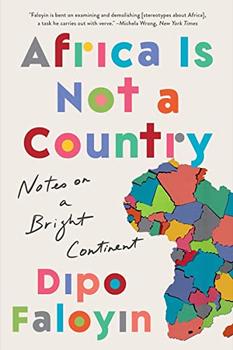Summary | Excerpt | Reviews | Beyond the Book | Readalikes | Genres & Themes | Author Bio

Notes on a Bright Continent
by Dipo Faloyin
Real challenges exist on the continent. To ignore them would be just as grave a distortion. Many do live in destitution; some governments have failed their citizens; and in parts, the gap between the wealthy and the forgotten continues to grow. But when you infuse this story with context, you see the bigger picture and understand why what has happened has happened. When you remember the cards the region was dealt as a result of colonialism, and the way European empires divvied up the fruitful and fertile land, tore apart 10 per cent of all ethnic groups – forcing grossly different cultures to form singular nations against their will – and stole 90 per cent of the continent's material cultural legacy; when you remember all this is recent history, and that my parents are older than the country they were born in; when you discover the high prevalence of dictatorships is a multifaceted tale of colonial powers deliberately playing tribal groups off against each other, with Western nations propping up their favourite strongman, and it's not that we are naturally bloodthirsty and ungovernable; when you taste Jollof rice for the first time, or see the work that activists and generations of reformers have put in since the independence era, you begin to understand that Africa is a region that is fundamentally rooted in human stories – which, like everywhere else, can be anything and everything, from a celebration of greatness to an act of barbaric cruelty. The continent constantly surprises, because every country is just trying to make the best of – to put it mildly – an awkward situation.
Each chapter of this book will bring the context that is often missing in discussions about Africa to the fore. You will discover how each country was formed by people with poor maps and even poorer morals. I will analyse the harmful ways Africa is depicted through cheap stereotypes in popular culture, and in the imagery used by charitable campaigns to elicit quick-fix solutions that often do more harm than good, by pushing negative typecasting. You will understand the story of democracy across the continent through seven dictatorships; the ongoing battle to have the artefacts and treasures that were stolen during the colonial period returned; and the impact food culture from across the continent has had on rituals throughout the world. Identity also requires a healthy rivalry, and you will discover the fabled Jollof rice wars and the strange, incongruent beauty of the Africa Cup of Nations. In the final section, I explore the present, and how locally led, on-the-ground activists, movements and emerging creative and business cultures are shaping the future of the continent, speaking to how communities are actually built – efforts that represent more than just dusty savannahs, civil wars, and a people without a voice of their own waiting for someone to speak for us, for others to swoop in and save.
But first, before we dive into the history of the continent, I want to take you to Lagos, my familial hometown, to show the present-day realities. Though this book is no travel guide of places to stay and sights to see, it is important to understand the varied specificity of the region. It's vital to immediately ground yourself in an environment; see, smell and envision yourself in the everyday, not hovering a mile above ground or surveying through a pair of binoculars. And no place is more distinct than the continent's most populous city: the blackest place in the world, sewn together by little more than optimism and vibes.
There is a fundamental misunderstanding as to what is happening in this great expanse of land. This book aims to fill that void, while showcasing a deep and enduring love of the region – as a concept, as a reality and as a promise. And should you come away with just one thing, then I want you to know, for certain, deep down in your innermost core, that the continent is a coalition of over a billion individual identities that structure specifically.
Excerpted from Africa Is Not a Country: Notes on a Bright Continent. Copyright (c) 2022 by Dipo Faloyin. Used with permission of the publisher, W. W. Norton & Company, Inc. All rights reserved.
Your guide toexceptional books
BookBrowse seeks out and recommends the best in contemporary fiction and nonfiction—books that not only engage and entertain but also deepen our understanding of ourselves and the world around us.